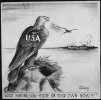captivecuties
Senator
When I was young, I worked in a large banquet resturant facility with many employees.
Two of the older men there were among the US that landed.
One operated a bull dozer and was # 2 to launch off the landing craft.
In front was # 1 dozer, naturally.
When # 1 launched, it promptly went in like a stone.
He was obviously anxious about his turn but it worked out.
I asked what it was like and was told that it was so loud that most had to cover their ears from time to time, when they could.
I also met Bill Guarnere of Bad of Brothers note and talked about just things, was a funny character.
Two of the older men there were among the US that landed.
One operated a bull dozer and was # 2 to launch off the landing craft.
In front was # 1 dozer, naturally.
When # 1 launched, it promptly went in like a stone.
He was obviously anxious about his turn but it worked out.
I asked what it was like and was told that it was so loud that most had to cover their ears from time to time, when they could.
I also met Bill Guarnere of Bad of Brothers note and talked about just things, was a funny character.







